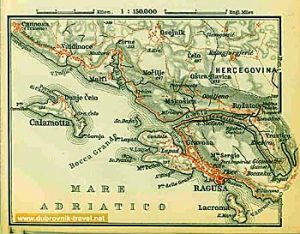Dubrovnik and Trade Agreements with Balkan Countries
 In 1215, Dubrovnik was granted special trading privileges by the Serb zupan (duke) Steven. Between1222-28, King Steven of Serbia granted the Dubrovnik traders full rights to trade all over the whole Serbian kingdom. Two years after in 1230, the Bulgarian Emperor Asen II granted similar trading rights in Bulgaria. Similar privileges were granted in 1234 by the Bosnian ruler Matthew Ninoslav.
In 1215, Dubrovnik was granted special trading privileges by the Serb zupan (duke) Steven. Between1222-28, King Steven of Serbia granted the Dubrovnik traders full rights to trade all over the whole Serbian kingdom. Two years after in 1230, the Bulgarian Emperor Asen II granted similar trading rights in Bulgaria. Similar privileges were granted in 1234 by the Bosnian ruler Matthew Ninoslav.
Ships and shipping constituted the other important pillar of Dubrovnik’s prosperity. To assure the security of its shipping and its trade, Dubrovnik established agreements with the major Mediterranean ports in the 13th century. This included amongst others Bari in 1201, Biseglia in 1221, Split 1229-31, Šibenik in 1234, Ulcinj (Montenegro) in 1245.
The result of the maritime and land agreements was that Dubrovnik exclusively dominated the trade with Slavic Balkan countries, all which needed access to products and crafts from the Western countries. Dubrovnik’s good relations with its eastern neighbours meant that it would become the minting place of the Serb kingdom. All over the Balkan peninsular and in ports like Ancona, Brindisi and Trani, there were whole colonies of Dubrovnik traders, all bound to the city not just through heritage but through common, mercantile interests.
The normal voyage from Venice or Ragusa to Alexandria, Syria, or Istanbul was not direct. Boats followed the Adriatic coast, stopping in the Peloponnesus, Crete, and Rhodes, not only for rest and commerce but also for safety. Ragusa was ideally located in the Adriatic between Venice and her eastern destinations. Ragusa had the Ottoman Empire to her south and east, Italy to her west, and the Austrian Hapsburg Empire to her north.
The total prioritisation of shipping and trade was the reason why Dubrovnik thrived. Since everyone benefitted from the pursuit of international trade, from the nobles to the lowest social order, socio-political harmony was maintained. Had it been otherwise, Dubrovnik would have certainly fallen prey to its plying, numerous and predatory neighbours.
The most Serene Republic had discovered the sources of its own prosperity in the Levant; therefore it did not interfere in the trade maintained by Dubrovnik. In the early medieval period, the Adriatic was for Venice merely a route to the Orient.
Dubrovnik was important as a stronghold, which they did defend against frequent Serb attempts to take over. Balanced precariously between East and West, Dubrovnik played a sensitive game of using its precarious position to its own advantage. This involved paying an annual tribute to various neighbours such as the Serb and Hungarian king. (Vicko Marelic)
Dubrovnik History Articles
- The History of Dubrovnik – an introduction
- The foundation in the Dark Ages – balancing on a borderland
- Early medieval times
- The beginning of trade
- Trade Agreements with Balkan Countries
- Breaking Away From Venice and Territorial Expansion
- The Ottomans Arrive
- Dubrovnik’s Golden Age
- Dubrovnik as the Focal Point of Dalmatian Enlightment
- Rudjer Boskovic – Dubrovnik’s Shining Example of the Enlightement
- The Jews of Dubrovnik

 Subscribe
Subscribe